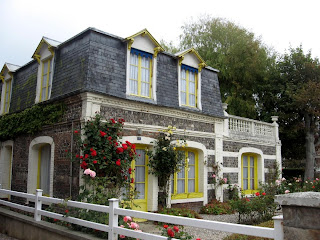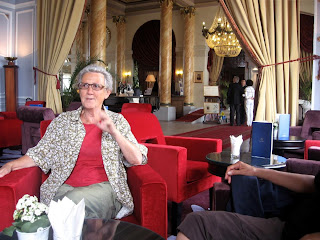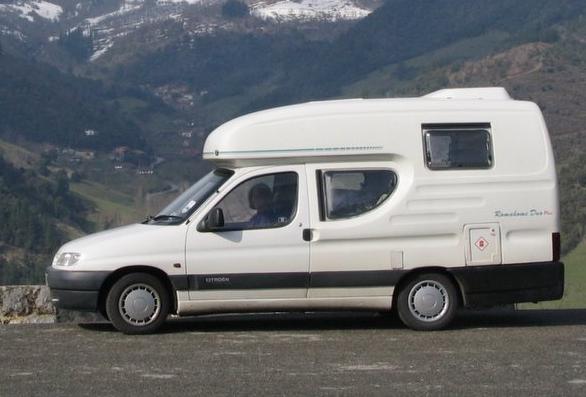Sunday 11th July 2010, Exeter, Devon
We last left you on the shores of Normandy as we returned to spend a few days in Caen before taking the ferry back to England. As you see, we are now back home and have spent the past few days settling back into the house and emptying out Modestine's coffers - unloading more bottles of wine than are really decent for a couple of pensioners. For the rest, we have been hacking back the branches and overblown weeds in the garden. The house has needed nothing doing to whatsoever, thanks to Steve who has cared for it so well while we have been off exploring.
Our final night camping in Modestine was at Veules-les-Roses on the coast of Upper Normandy. Next morning we discovered just what a charming and appropriately named little resort it was. Its proud boast is that it has the shortest river in France! Bravely, with set out to fight our way upstream from the estuary, determined to explore its shores right the way to the very source. Struggling past exquisite gardens of climbing roses and tubs of petunias, skirting the ruins of the ancient water mill and the fast-flowing waters through the green beds of watercress we eventually reached the shallow source, half a kilometre beyond the heart of the village, to find it fiercely protected by a couple of swans and half a dozen wildfowl.

The coast had obviously suffered from wartime bombardment and the buildings on the seafront were mainly modern hotels though very pleasant and with a garden walk beside the shore. Just behind, the old village stands, much as it has always done, a street of attractive brick and flint cottages from the 18th and 19th centuries, many set in gardens redolent with honeysuckle, climbing roses, hanging baskets, lawns and fruit trees. One was for sale! How absolutely perfect! It was market day with stalls set up the length of the main street, selling fruit and vegetables, French cheeses, eggs and dairy produce, honey, hand-made soaps, charcuterie, sea fish and organic meat.






Along the coast we stopped at St. Valery en Caux, a fishing port which had lost most of its charm during WW2 when it suffered badly from bombardment. We were though very impressed with the drunken looking 16th century half-timbered house on the quayside. The white chalk cliffs here are also very impressive.


We visited Fécamp, further along the coast several years ago and toured its Benedictine abbey, famed for the production of a liquor based on a secret recipe of herbs gathered on the cliff tops above the town. Deciding a visit required considerably longer than we could spare, we turned inland to cross the Seine just above its estuary where it reaches the sea at Le Havre. The Seine separates Upper and Lower Normandy, the two departments linked by toll bridges - the huge, modern Pont de Normandie and the older Pont de Tancarville, which is the crossing we selected.

Le Havre, incidentally, is to our eyes a horrible industrial town surrounding the port with its oil refineries. The town was decimated during the Second World War and later reconstructed. The style is brutal, ugly, constructed in concrete and now very dated. However, because it was rebuilt as an entity to plans of one architect, Auguste Perret, it is now on the Unesco World Heritage list as an outstanding example of post war urban planning.
By early evening we were back in Caen where Geneviève already had supper simmering in the kitchen and a real, comfortable bed waiting for us. Apart from the smart redecoration since her fire, it felt to us what it has become, our "home from home" while we are travelling in Europe. After cool showers and clean clothes we joined her for wine in the garden. Soon our friend Claire joined us. That's how welcome Geneviève always makes us feel, inviting some of our other friends for supper while we are with her so we see the maximum number of friends during our stay!
Early next day Ian disappeared to the local archives where he worked solidly all day tidying up odd ends of research. Meanwhile Chantal and her two Vietnamese teenage daughters joined us for the afternoon for some odd jobs of bricolage around the house and cherry picking in the garden.
On Friday Ian returned to his archives which he found hot, sticky and airless. Meanwhile Geneviève and I went food shopping in the local market returning with goat's cheese and red onion quiche for lunch. Stopping for a mineral water at a local bar we were horrified to receive a bill of five euros! Beer would have been cheaper. We are pretty certain the opened bottles had been filled with tap water and the waitress had definitely not attended a course on customer care.

During the afternoon Geneviève's amazingly active and agile mother Germaine called in for coffee and in the evening we were joined for supper by Marie Françoise, another retired Caen library friend.
Saturday dawned as hot as ever. Ian had finished in the archives so we drove out onto the Plaine de Caen to visit the second-hand charity store of Emmaüs. It is housed in the grounds of a decomposing 18th century chateau a few kilometres inland from the sea. It is the sheer diversity of items offered for sale that we find so intriguing. There was nothing we wanted but always the exciting possibility of discovering something we never realised we needed. Bird cages, wedding dresses, gas cylinders, wardrobes, a chamber pot, a bicycle and a holy picture were all piled pell-mell together. The charity is run by prisoners and proceeds are used to assist them in rehabilitation.
We drove the short distance to the sea at St. Aubin-sur-Mer for lunch. Right beside the beach we found a sea food restaurant serving the traditional French dish of moules et frites. While waiting for it to be prepared we were offered a plate of huge shell fish. What they were I don't know but they were quite disgusting! Huge creatures that needed coxing out of their shells using a large pin and twisting them around until their huge bodies splatted out, dripping fluids all over the cloth. Yuck! Ian and I ate one each before turning rather green and pushing the rest away. Remind us never to order a tower of fruits de mer which is a selection of all kinds of similar sea monsters. When our moules arrived however, they were very nice though rather too salty. Cooked in white wine with onions and herbs we each faced a huge pile with a communal dish for the used shells and another filled with delicious crisp chips.


After a stroll around the town we headed for the estuary of the Orne at Salenelles where we hoped to gather fresh salicorne on the mudflats. (samphire in English.) We saw many little crabs scudding across the mud at the bottom of the drainage ditches amidst the marshes edging the estuary but no salicorne – a much branched, fleshy green plant we have been assured tastes like runner beans. In Caen the market had been full of it on Friday. The area was lonely and hot beneath the burning sunshine. Much of the mud had dried and cracked forming natural works of art. There were many flowering plants as well as gulls and sea birds. Scattered around the marshes we encountered several hides, well camouflaged, for shooting ducks as they fly over at dawn and dusk.


Next we drove to Cabourg, the chic seaside resort so loved by the writer Marcel Proust. It usually seems to be winter when we are there so for once we were able to see it crowded with visitors filling the terraces of the little bars and cafés while on the beaches families built sand castles or splashed around in the gentle waves. All along the beach there were smart blue umbrellas, shades, and beach loungers set up for hire.
If the Grand Hotel was good enough for Marcel Proust, it was fine for us. Leaving lesser mortals to the cafés in the town we settled into velvet armchairs and chaises longues amidst the sparkling chandeliers and mirrors of the hotel lounge where we were served with a pot of coffee on a silver salver with a selection of tiny biscuits by a uniformed waitress. Such experiences can be great fun from time to time and provided us with a chance to explore the casino and the rest of the luxuriously appointed ground floor of the Grand Hotel, overlooking the beach.



On Sunday we drove to Bayeux, where back in the winter of 2009 we spent several weeks in a garret flat of a grand and beautiful 18th century residence. This time the ornamental garden at the front basked in the hot sunshine rather than hiding beneath the snow as previously.

The streets of Bayeux were heaving with holiday crowds as well as local residents. It was the day of the Mediaeval fair with thousands lining the streets to watch the parade pass by. The costumes were brilliant though some, such as the stilt walkers and the man in his flying machine did not look quite authentically mediaeval – though he could have been Leonardo da Vinci, I suppose. Knights, maidens, archers, jugglers and musicians all passed along the streets, sometimes groups stopping to dance or play a tune for the crowds. There was a relaxed and happy atmosphere while all around the town, stalls were grilling sausages and serving them with a baguette and a glass of Bayeux cider. We enjoyed ours sitting beside the steps of the war memorial outside the town hall.





Meanwhile, up on the green at Place Charles de Gaulle mediaeval war machines were hurling water bombs into the crowd. Nobody minded on such a hot day. Outside the cathedral a group of musicians in tights, scarlet tunics and tasselled hats were belting out very 20th century rock music on their reproduction mediaeval instruments! The crowds loved it. The main doors to the cathedral were wide open, the music pounding and ricocheting around inside!



Early next morning we bid Geneviève au revoir and headed for the ferry port at Ouistreham. By 8am we were enjoying hot showers in our cabin before heading upstairs to the restaurant for a full English breakfast and coffee. Brittany Ferries really is the most organised and efficient service on any route we've encountered in Europe. Boarding is a work of art with every move perfectly synchronised by the ground crew. Travelling with them is generally a very pleasurable experience, even for a tall vehicle such as Modestine. Roll on roll off ferries mean she never has to do awkward turns on board or come off backwards as has sometimes happened on other routes.
By lunch time we were back in England, driving through the New Forest where we stopped for a picnic before calling briefly on friends near Salisbury. Soon we were back in Exeter since when we have been picking up the threads of our daily life. The weather has continued to be hot and dry. Tomorrow though, is Ian's birthday and we have planned a small celebration in the garden with all our local friends. Tonight the rain has started so it looks likely our five years of retirement and travelling will have to be celebrated indoors.
Our friends are very important to us so our homecoming has been saddened by the recent news of the death of Hans in Munich. Our sympathies are very much with Charlotte who has cared for him so lovingly during his illness and now finds herself alone. We are so very glad that we had the opportunity to see Hans during our brief visit to Munich in June, before his health deteriorated rapidly, so that our memories of him will always be happy ones.
Thank you everybody for your continued support during our travels - sending us messages and reading our reports. It means we never feel alone as we journey around Europe and it makes the sometimes demanding routine of producing a regular blog worthwhile. We have no immediate plans to return to Europe for an extended visit. We both need a rest and to simply enjoy being back in our own home for a while.

